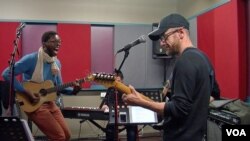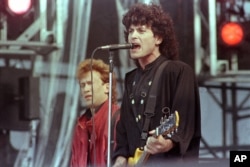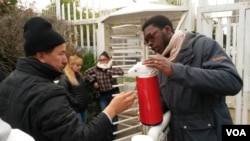Gaetan Ziga and his band are rehearsing for a concert. Outside, the sounds of sirens ring out and hooded men lurk in the shadows — the usual fare in Paris' gritty La Chapelle neighborhood where they practice.
But another sound is coming from inside the small studio, as the band picks over a section of La Rosée du Matin, or Morning Dew, the title track of Ziga’s new album about refugees.
As the band’s lead guitar player and vocalist, Ziga doesn’t have to look far for inspiration.
Immigrants from all parts of the world squat in tent camps around the city until authorities demolish them. Some count among the wave of asylum seekers who have poured into Europe over the past year.
In countries like Poland and Croatia, many have been met with rising walls and closed doors. The welcome is even fading in Germany, which took in more than one million migrants last year, after Arab men were among those blamed for New Year’s Eve attacks in Cologne.
Not so in the music industry, where the influx of newcomers has instead sparked an artistic awakening of sorts. German punk rock band Die Ärzte has dusted off its 1992 song, "Cry For Love," which soared in the charts recently in response to far-right attacks on refugee shelters.
Russian group Pussy Riot has released a tough new video demanding that European governments "let refugees in."
Another music video released in Britain features the Crowded House song, "Help is Coming," played to haunting images of refugees — with British actor Benedict Cumberbatch urging the world to respond. Proceeds from that video are going to the international charity Save the Children.
A sign of the times
“The impact of something like the "Help is Coming” single is as much getting people aware of the issue, getting them engaged, getting them emotionally involved as the money it’s raised,” said Nicole Itano, who runs Save the Children’s creative department in Britain.
She also said the charity did not drive the campaign; its supporters did. “Increasingly we’re seeing the most successful things are those enabling our supporters to advocate and raise money on our behalf,” she said.
The refugee music has a star-studded precedent: the 1985 Live Aid event raised over $100 million for famine relief in Ethiopia, but left a mixed legacy. Critics described the worldwide concerts that drew stars like U2 and Madonna as clumsy and patronizing and suggested some of the funds were badly spent.
University of Sussex history professor Lucy Robinson said Live Aid also changed negative perceptions about the music industry and the era.
“It became the go-to image of proving that the 1980's wasn’t all greed and individualness, that pop music wasn’t all Duran Duran on yachts and piles of cocaine,” she said. “It was also about media technology of simultaneous broadcasts and the world working together to solve a global crisis.”
Robinson said she became an expert in charity music almost by accident, collecting secondhand albums of what she called “cheesy songs you’re never going to play.”
“If they’re going to be any good, they’ve got to be really bad,” she said, laughing. “It’s a proper donation to buy something you don’t even want.”
Back to roots
Today’s charity music is almost a return to its pre-Live Aid roots, “that earlier idea of urgency and swift responses, throwing it all together and spontaneity,” Robinson said.
In some ways, that captures Reach Out — a download only album bringing together Welsh groups like Super Furry Animals. Welsh journalist David Owens founded the project, whose proceeds go to British charity Refugee Action.
“The idea came after I saw pictures of Aylan Kurdi washed up on the Turkish shore,” Owens said of the drowned Syrian toddler whose death briefly galvanized international outrage over the plight of refugees.
“I have a 6-year-old daughter, and I think it just resonated hugely with me," he said. "I just couldn’t believe we lived in a day and age when this sort of thing keeps happening.”
Gaetan Ziga knows the hardships facing asylum seekers better than most musicians. At least once a week, he’s up before dawn, serving coffee to immigrants as head of a youth volunteer group in the Essence area outside Paris.
“It’s really good that Gaetan puts what he witnesses into music,” said a regional Secours Catholique organizer Francois-Marie Debont, who works with him. “And he’s someone who has lived things a bit from the inside.”
Indeed, Ziga is an immigrant himself, arriving in France from his native Cameroon at the age of 13. Eight years later, he became a French citizen.
His Catholic faith and his family have taught him to reach out to those less fortunate, he said. The family recently raised funds to build a hospital near his native village.
“When I was a child, my mother used to go to town to sell our harvest, and she’d sometimes return with an orphan whom we raised,” he says. “It’s an education I can’t forget.”
Anger about Europe’s treatment of asylum seekers drove Ziga to write his latest album.
“I’m not a specialist on how to welcome people in,” he says. “But everybody has the right to live in peace and liberty.”















